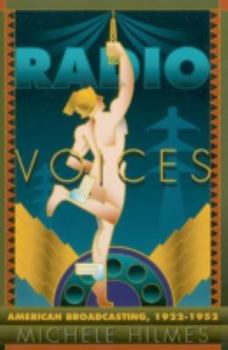Radio Voices: American Broadcasting, 1922-1952
Select Format
Select Condition 
Book Overview
An overview of radio's impact on American culture in the first half of the twentieth century.
Format:Paperback
Language:English
ISBN:0816626219
ISBN13:9780816626212
Release Date:April 1997
Publisher:University of Minnesota Press
Length:384 Pages
Weight:1.24 lbs.
Dimensions:0.8" x 5.9" x 9.0"
Customer Reviews
3 ratings
A Must Read
Published by Thriftbooks.com User , 17 years ago
Radio Voices: American Broadcasting, 1922-152 is a must read for those who wish to learn about this important period in our history. It is an excellent book for those who remember those wonderful days, and for those who want to learn what their parents or grandparents were talking about!
radio constructed America
Published by Thriftbooks.com User , 22 years ago
"Radio Voices" offers an overview of the radio's impact on America. Hilmes describes the way this media interacted, effected, and was influenced by phenomenon such as urbanization, immigration, the rise consumer culture, racial tension, the notion of gender roles, WWI, and WWII. I particularly enjoyed her dealings with gender and race. Hilmes reveals the invention and propagation of racial tension as she discusses the portrayal of blacks as an uneducated group participating in society secondarily to white listeners, and most often in positions of servitude. Hilmes' treatment of women in the text reveals their suseptibility to consumerism and their exclusion from nighttime/masuline radio air time. She describes the waxing and waning acceptance of women into positions of power in the radio industry as well as the evolution of gender roles as a result of female shows such as the first soap operas (serials). The end of the text addresses the radio propaganda surrounding WWII, including the encouragement of black soldier participation and women in the workforce. Overall, I feel the text broadenend my knowledge of the radio's influence on American culture, not only between 1922-1952, but in modern society. The radio served as a means to American unification, and traces of this cultural foundation still remain profoundly engraved in the notion of what it means to be an American. After reading this text I feel I can examine, more objectively, the media I absorb today.
A fun... and insightful historical look at radio
Published by Thriftbooks.com User , 23 years ago
An outstanding, if slightly academic, homage to the glory days of live radio. Hilmes is both a fan of the medium and a critic of its development, paying special attention to radio's role in shaping American national identity. The presentation of women and various ethnic groups is one of her main concerns, but Hilmes isn't a mere PC grind; she also explores the nuances of supposed stereotypes, analyzing the degree to which these characterizations both shaped and reflected the world around them. It's fascinating to read an account of a seemingly "dead" medium... She does a great job capturing the flavor of the times, even though most of us will never be able to hear the shows she mentions. Hilmes draws upon several major media libraries, as well as extensive governmental and academic archives, mixing bureaucratic, sociological and pop cultural perspectives. Of particular interest to readers in the present day, where multinational conglomerates duke it out over the vanishing frontier of post-dotcom economy, and the FCC and Congress have sharply curtailed freedom of expression (under the guise of protecting intellectual property), is the older, earlier story of how the US government and the budding broadcast industry squelched the amatuer broadcasters of the 'teens and '20s. In some ways it's a side note to Himes' wider social concerns, but it couldn't be more timely. Recommended reading!






